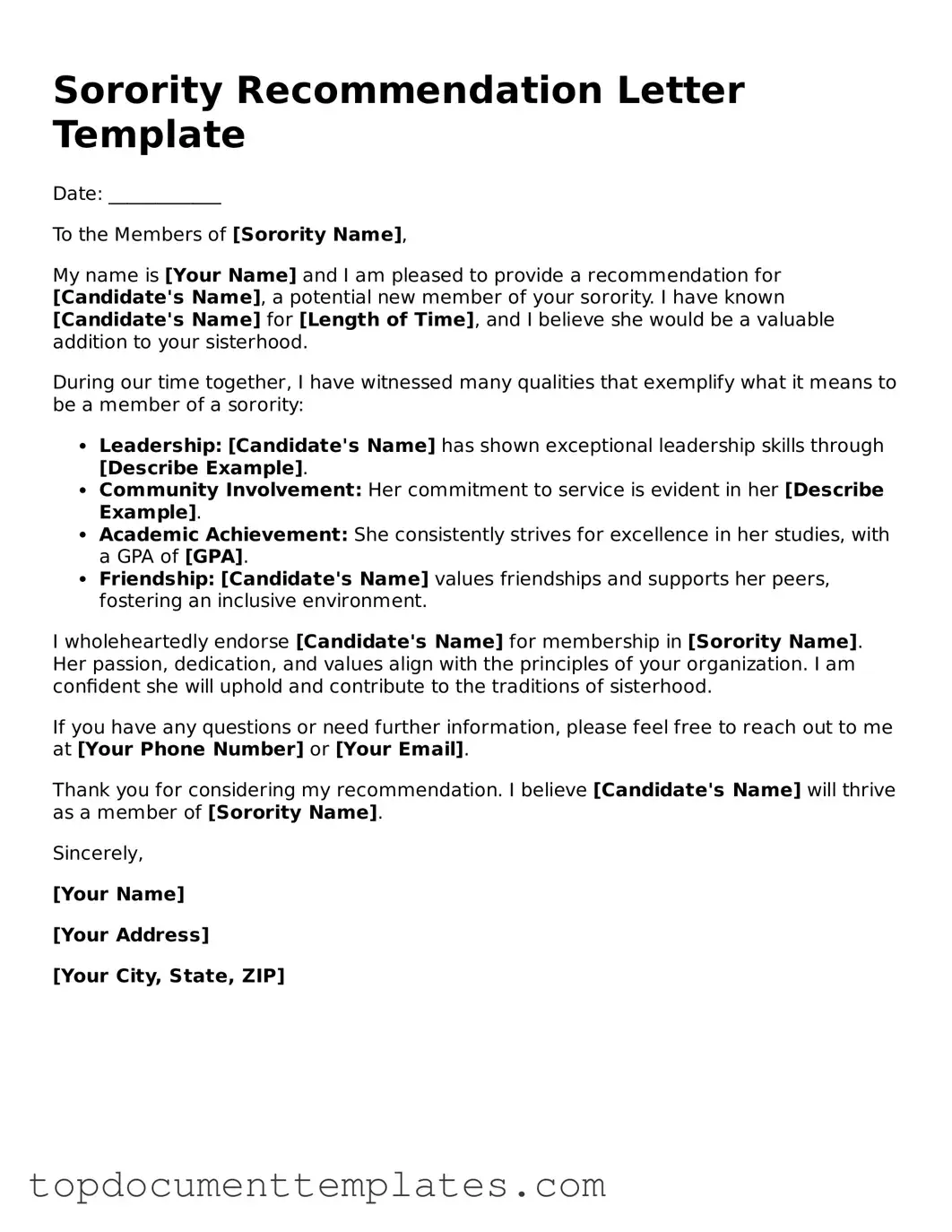Official Sorority Recommendation Letter Template
When navigating the vibrant world of sorority recruitment, the Sorority Recommendation Letter form plays a crucial role in helping potential new members present themselves to chapters. This form serves as a personalized endorsement, typically written by an alumna of the sorority, who can provide insights into the candidate’s character, achievements, and suitability for membership. The recommendation letter often includes essential details such as the applicant's academic performance, extracurricular activities, and personal qualities that make her a strong fit for the sorority's values and culture. Additionally, it may feature specific anecdotes that highlight the candidate's leadership skills or community involvement. As sororities strive to build diverse and dynamic sisterhoods, a well-crafted recommendation can significantly influence a candidate's chances of receiving an invitation to join. Understanding the importance of this form is key for any prospective member looking to make a memorable impression during the recruitment process.
Similar forms
- College Recommendation Letter: Similar to the Sorority Recommendation Letter, a college recommendation letter provides insight into a student's character, achievements, and potential. Both documents aim to support an individual's application by highlighting their strengths and suitability.
- Job Recommendation Letter: A job recommendation letter shares similarities in its purpose of endorsing an individual's qualifications for a position. Both letters typically include specific examples of the candidate's skills and experiences relevant to the opportunity they are pursuing.
- Scholarship Recommendation Letter: This document, like the Sorority Recommendation Letter, seeks to advocate for a candidate's eligibility for financial support. It emphasizes the individual's academic achievements and personal qualities that make them a deserving recipient.
- Graduate School Recommendation Letter: This type of letter is akin to the Sorority Recommendation Letter in that it highlights an applicant's readiness for advanced study. Both letters often discuss the candidate's intellectual capabilities and contributions to their field.
- Volunteer Recommendation Letter: A volunteer recommendation letter serves a similar function by endorsing a person's character and commitment to community service. Both documents focus on the individual’s dedication and impact in their respective environments.
- Internship Recommendation Letter: Like the Sorority Recommendation Letter, this document supports an applicant's pursuit of an internship by detailing relevant skills and experiences. It aims to provide a comprehensive view of the candidate's qualifications.
- Character Reference Letter: This letter shares similarities with the Sorority Recommendation Letter in that it provides a personal perspective on an individual's character. Both types of letters are often used in various application processes to vouch for a person's integrity and reliability.
- Professional Reference Letter: A professional reference letter is akin to the Sorority Recommendation Letter as it offers insights into a candidate's work ethic and professional demeanor. Both documents aim to bolster the individual's application by providing credible endorsements.
- Personal Reference Letter: This type of letter is similar in nature, as it emphasizes personal qualities and experiences that make the individual a strong candidate. Both documents focus on the applicant's personality traits and contributions to their community.
- Membership Recommendation Letter: This letter is closely related to the Sorority Recommendation Letter, as it specifically endorses an individual's application for membership in an organization. Both documents typically outline the candidate's qualifications and fit within the group.
Guidelines on Writing Sorority Recommendation Letter
Completing the Sorority Recommendation Letter form is an important step in the sorority recruitment process. Properly filling out this form ensures that the candidate receives the support needed from current members. Follow these steps carefully to provide accurate and complete information.
- Begin by entering the candidate's full name at the top of the form.
- Provide the candidate's contact information, including her email address and phone number.
- Fill in the candidate's academic details, such as her school name, year of study, and major.
- Include information about the candidate's extracurricular activities and leadership roles.
- Write a personal statement or recommendation about the candidate, highlighting her strengths and qualities.
- Sign and date the form at the bottom to validate your recommendation.
- Submit the completed form according to the specified submission guidelines, which may include mailing or emailing it to the designated sorority member.
File Information
| Fact Name | Description |
|---|---|
| Purpose | A Sorority Recommendation Letter form is used to recommend a potential new member to a sorority. |
| Eligibility | Typically, the form is filled out by alumnae of the sorority or current members. |
| Content Requirements | The form usually requires personal information about the candidate, including academic achievements and extracurricular activities. |
| Submission Deadline | Each sorority has its own deadline for submitting recommendation letters, often coinciding with recruitment events. |
| State-Specific Forms | Some states may have specific forms or requirements based on local sorority chapters. |
| Confidentiality | Recommendation letters are often kept confidential and are not shared with the candidate. |
| Signature Requirement | Most forms require a signature from the recommending member, verifying the information provided. |
| Governing Laws | In some states, laws regarding privacy and personal information may apply to the collection of data in recommendation letters. |
| Importance of Accuracy | Accurate and honest information is crucial, as it reflects on both the candidate and the recommending member. |
Find Other Types of Sorority Recommendation Letter Templates
Adoption Recommendation Letter - A brief account of the applicant's advocacy for children's rights.
Support of Immigration Letter - Being clear about how long the supporter has known the couple adds weight to their testimony.
